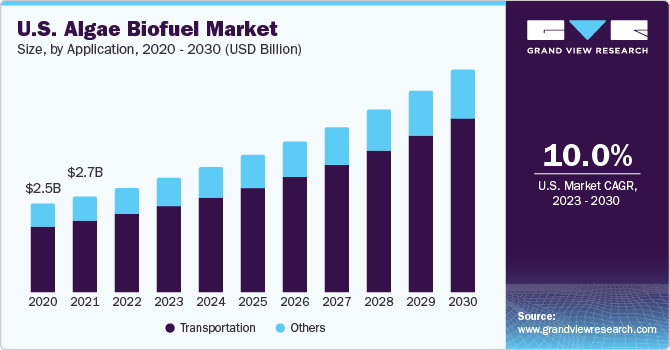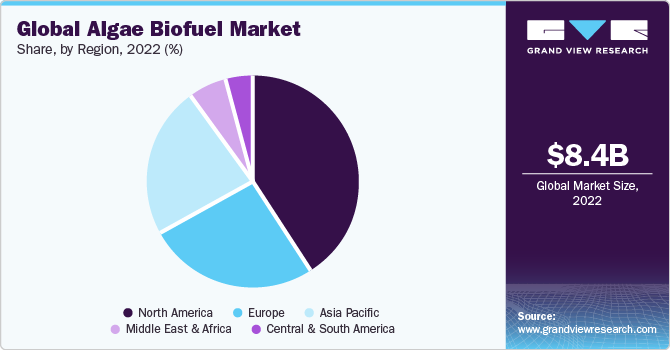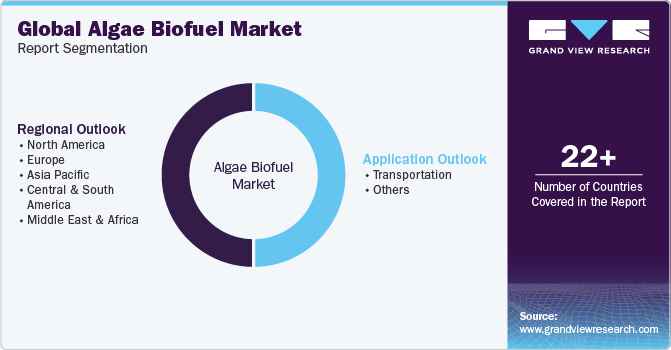- Home
- »
- Renewable Chemicals
- »
-
Algae Biofuel Market Size, Share & Trends Report, 2030GVR Report cover
![Algae Biofuel Market Size, Share & Trends Report]()
Algae Biofuel Market (2023 - 2030) Size, Share & Trends Analysis Report By Application (Transportation, Others), By Region (North America, Europe, Asia Pacific, Central & South America, Middle East & Africa), And Segment Forecasts
- Report ID: GVR-1-68038-775-9
- Number of Report Pages: 75
- Format: PDF
- Historical Range: 2018 - 2021
- Forecast Period: 2023 - 2030
- Industry: Specialty & Chemicals
- Report Summary
- Table of Contents
- Segmentation
- Methodology
- Download FREE Sample
-
Download Sample Report
Algae Biofuel Market Summary
The global algae biofuel market size was estimated at USD 8.38 billion in 2022 and is projected to reach USD 17.94 billion by 2030, growing at a CAGR of 10.1% from 2023 to 2030. This growth can be attributed to an increasing demand for bio-based resources to replace traditional fossil fuel products.
Key Market Trends & Insights
- North America dominated the market and accounted for the largest revenue share of 41.3% in 2022.
- The U.S. government has mandated a shift in the production of biofuel from food-based crops to microalgae-based crops, which is expected to boost the demand for biofuel over the forecast period.
- By application, transportation accounted for the largest revenue share of around 75.3% in 2022 and is expected to grow at the fastest CAGR of 10.6% over the forecast period.
- By application, growing demand for alternative liquid fuel products in the commercial aviation sector and military applications is expected to be a key factor driving the market growth over the projected period.
Market Size & Forecast
- 2022 Market Size: USD 8.38 Billion
- 2030 Projected Market Size: USD 17.94 Billion
- CAGR (2023-2030): 10.1%
- North America: Largest market in 2022
The high potential associated with algae to produce bioethanol, biodiesel, drop-in biofuels, and hydrocarbons coupled with initiatives taken by the manufacturers to commercialize the product is expected to open new avenues for the industry. The algae industry has been struggling to sustain itself in the biofuel market over the past decade; furthermore, decommissioning of major algae biofuel commercial projects has restrained the industry growth. However, the product has the potential to witness enormous scope once the manufacturers are capable of overcoming the key barriers associated with raw material manufacturing, capital cost, and production volumes.
The introduction of biofuel mandates across the world is expected to compel manufacturers to invest more in R&D to develop sustainable algae fuel production technology over the forecast period. The U.S. produced over 1.14 billion gallons of biofuel in the year 2016 from various feedstock including animal fats and recycled seeds.
The high potential of algae to replace traditional biofuel raw material sources coupled with the mandates introduced by the U.S. government are expected to open new avenues for product growth, which is expected to be adopted by other regions over the projected period.
The market has numerous start-up companies located across the world. The majority of these players are situated in North America, owing to the high government support and low technology barriers in the region.
The companies in the sector are expected to be integrated across the value chain to limit their dependency on raw material suppliers. In addition, the industry is expected to foresee collaborations and partnerships among the manufacturers in order to produce high volumes of the product along with the substitute competitive pricing.
Due to their high yield, algal biofuels have the potential to replace other bioethanol resources such as corn stover, cassava, corn, sugar beet, sweet sorghum, and switch grass. Compared to other products such as corn, sunflower, sugar cane, and soybeans, algae require only carbon dioxide, water, and sunlight, which stimulates its growth. In addition, algae are capable of producing 5,000 to 20,000 gallons of oil per unit area per year. These factors are expected to drive market growth over the coming years.
In addition, increasing demand for renewable fuels among consumers is anticipated to be a major factor driving the market. Growing awareness regarding renewable energy sources, owing to various research studies being conducted, enables consumers to understand the need to shift from fossil fuels toward alternate energy sources. For instance, as per IEA, the global demand for biofuels is expected to increase by 28% by 2026. Furthermore, government initiatives, such as incentives for renewable energy production or usage and funding for research & development in breakthrough technologies or best practices, are anticipated to prompt power producers to adopt clean energy sources, thereby boosting the market growth.
Increasing government initiatives for capacity addition and tax incentives are expected to majorly boost the growth of the biodiesel market over the forecast period. As biodiesel is, a highly energy-efficient fuel it helps in alleviating energy security risks and the pollution levels associated with the use of fossil fuels. Countries such as Brazil, Germany, and the U.S. have initiated tax incentives to boost the production of biofuels and reduce the price of biodiesel at pumps. European countries such as France, Italy, Germany, Spain, Denmark, and the Czech Republic are also permitting full tax exemption for a specific volume of biodiesel production.
Large-scale production of algae biofuels involves significant challenges due to the high cost of production. This factor is expected to restrain the market growth during the forecast period. Another major challenge faced by the market is the extraction of algal oil. At present, three key methods are used for the extraction of algal oil including hexane extraction, CO2 fluid extraction, and oil expellers. Although these technologies are effective for manufacturing algal oil, they are very expensive, as they require costly equipment and high-energy consumption, which heighten the cost of the final product. The infeasibility of these processes to produce large volumes at low cost is expected to hamper the market growth over the forecast period.
Increasing demand for biofuels in road vehicles such as heavy-duty trucks, commercial vehicles, two-wheelers, and passenger vehicles is expected to propel manufacturers to incur in research and development activities to develop low-cost renewable fuel. The above factors are expected to provide new growth opportunities for transportation during the forecast period.
Application Insights
The algae biofuel market is segmented on the basis of transportation and others. Transportation accounted for the largest revenue share of around 75.3% in 2022 and is expected to grow at the fastest CAGR of 10.6% over the forecast period, owing to the potential of algae to replace traditional diesel and petrol products. The rapid growth of the automotive sector owing to rising consumer income and technology innovations is expected to propel the demand for new sustainable raw material sources such as algae.
Growing demand for biofuel in road transport applications including small trucks, minivans, light-duty vehicles, motorbikes, and passenger travelers is expected to compel manufacturers to invest more in R&D to develop low-cost renewable fuel resources. The aforementioned factors are expected to open new market opportunities for the product growth in transportation applications over the forecast period.
Growing demand for alternative liquid fuel products in the commercial aviation sector and military applications is expected to be a key factor driving the market growth over the projected period. Initiatives taken by the manufacturers to achieve the required fuel standards and a positive government outlook for the industry are likely to drive growth.
Regional Insights
North America dominated the market and accounted for the largest revenue share of 41.3% in 2022, owing to the high demand for manufacturing of bioethanol. In addition, changing crude oil dynamics have created an opportunity for investment in alternative fuel technologies in North America. Continuous investments in R&D activities by manufacturers to utilize the maximum photosynthetic efficiency of algae strains are resulting in increased extraction of algae oil, which is expected to have a positive impact on the market growth over the forecast period. The U.S. government has mandated a shift in the production of biofuel from food-based crops to microalgae-based crops, which is expected to boost the demand for biofuel over the forecast period.

Asia Pacific is expected to grow at the fastest CAGR of 10.5% during the forecast period. Increasing investments by public and private organizations in renewable and bio-based energy sources in China, Japan, and India are expected to have a positive impact on the market growth over the forecast period.
Europe is expected to grow at a CAGR of 10.3% during the forecast period, owing to the demand for algae biofuel primarily in biodiesel production. Favorable government policies for promoting energy generation from non-conventional sources are expected to boost market growth. The government of the U.K. intends to use biofuel for meeting the aviation fuel needs in order to reduce GHG emissions. Algae oil can be used to blend aviation fuel as it has a positive impact on aircraft performance by lowering operating expenditures. These factors are expected to drive the regional market over the forecast period.
Germany has a positive outlook in terms of subsidies and incentives for research institutes and manufacturers involved in the production of sustainable bio-based fuel resources. Also, numerous R&D activities, robust engineering systems, and research-intensive small and medium-sized enterprise supporting the cultivation and utilization of microalgae is expected to have a positive impact on the market growth over the forecast period.
Key Companies & Market Share Insights
Product development and customized products are expected to be the key parameter for being competitive in this industry, with frequent joint ventures, mergers, and acquisitions being undertaken as an attempt to diversify product portfolio and gain market share.
Key Algae Biofuel Companies:
- Algenol Biotech
- Blue Marble Productions, Inc.
- Sapphire Energy
- Culture BioSystems
- Origin Oils
- Genifuel Corporation.
- Algae Systems, LLC.
- Solix
- Reliance Life Sciences
- AlgaEnergy
Recent Developments
-
In March 2023, Viridos, Inc., a leading innovator in algae-based biofuel technology with a focus on producing environmentally friendly, low-carbon jet and diesel fuels, made a significant announcement. The company revealed the successful completion of a Series A funding round, securing a substantial investment of USD 25 million. This Series A funding round was led by Breakthrough Energy Ventures (BEV) and featured participation from United Airlines Ventures and Chevron U.S.A. Inc.. These funds will be directed toward research and development efforts aimed at enhancing the productivity of algae-derived oil to make it suitable for widespread commercial use.
Algae Biofuel Market Report Scope
Report Attribute
Details
Market size value in 2023
USD 9.14 billion
Revenue forecast in 2030
USD 17.94 billion
Growth Rate
CAGR of 10.1% from 2023 to 2030
Base year for estimation
2022
Historical data
2018 - 2021
Forecast period
2023 - 2030
Report updated
November 2023
Quantitative units
Revenue in USD million, Volume in million gallons and CAGR from 2023 to 2030
Report coverage
Revenue forecast, company ranking, competitive landscape, growth factors, and trends
Segments covered
Application, region
Regional scope
North America; Europe; Asia Pacific; Central And South America; MEA
Country scope
U.S.; Canada; Mexico; Germany; UK; France; Italy; Spain; China; India; Japan; South Korea; Thailand; Indonesia; Malaysia; Australia; Brazil; Argentina; Saudi Arabia; South Africa
Key companies profiled
Algenol Biotech; Blue Marble Productions, Inc.; Sapphire Energy; Culture BioSystems; Origin Oils; Genifuel Corporation.; Algae Systems, LLC.; Solix; Reliance Life Sciences; AlgaEnergy
Customization scope
Free report customization (equivalent up to 8 analyst’s working days) with purchase. Addition or alteration to country, regional & segment scope
Pricing and purchase options
Avail customized purchase options to meet your exact research needs. Explore purchase options
Global Algae Biofuel Market Report Segmentation
This report forecasts revenue growth at global, regional, and country levels and provides an analysis of the latest industry trends in each of the sub-segments from 2018 to 2030. For the purpose of this study, Grand View Research has segmented the global algae biofuel market on the basis of application, and region:

-
Application Outlook (Revenue in USD Million, Volume in Million Gallons, 2018 - 2030)
-
Transportation
-
Others
-
-
Regional Outlook (Revenue in USD Million, Volume in Million Gallons, 2018 - 2030)
-
North America
-
U.S.
-
Canada
-
Mexico
-
-
Europe
-
Germany
-
UK
-
France
-
Italy
-
Spain
-
-
Asia Pacific
-
China
-
India
-
Japan
-
South Korea
-
Thailand
-
Indonesia
-
Malaysia
-
Australia
-
-
Central and South America
-
Brazil
-
Argentina
-
-
Middle East and Africa
-
Saudi Arabia
-
South Africa
-
-
Frequently Asked Questions About This Report
b. The global algae biofuel market size was estimated at USD 8.38 billion in 2022 and is expected to reach USD 9.14 billion in 2023.
b. The global algae biofuel market is expected to witness a compound annual growth rate of 10.1% from 2023 to 2030 to reach USD 17.94 billion by 2030.
b. Transportation was the largest application segment accounting for more than 75.3% of the total revenue in 2022 owing to the development of new low-cost technologies introduced by various governments around the world and significant investment in biofuel regulations.
b. Some key players operating in the algae biofuel market include Algenol Biotech, Inc., Corbion, Algae Production Systems, and BioSystems.
b. Rising demand for biofuels and tax incentive schemes by the government are some of the key factors driving the growth of the algae biofuel market.
Share this report with your colleague or friend.
Need a Tailored Report?
Customize this report to your needs — add regions, segments, or data points, with 20% free customization.

ISO 9001:2015 & 27001:2022 Certified
We are GDPR and CCPA compliant! Your transaction & personal information is safe and secure. For more details, please read our privacy policy.
Trusted market insights - try a free sample
See how our reports are structured and why industry leaders rely on Grand View Research. Get a free sample or ask us to tailor this report to your needs.










